|
| |
Academics - An Intellectual Journey
| I have spent a
lifetime pursuing knowledge. I was driven by the big questions:
is there life after death, is there a non-material component to humans (a
soul), is there a God? Ultimately, given all we know, we don't know
the answers to these questions just have better or worse hypotheses.
These questions drove me to Philosophy, and I am ultimately a Philosopher,
but I had to study many other subjects (such as science) to do serious
Philosophy. For example, to understand the relation between the mind
and the brain I delved into neuroscience at Grinnell to do advanced research
on neurophysiology, neuroanatomy, and neuropharmacology. Getting no
satisfying answers this way I went into Philosophy of Mind (the Philosophy
degree at Berkeley) which at least asked the questions about the relation
between the mind and the brain rather than just assuming they are the same
without sufficient evidence and ignoring all the problems with that
position. I went into computational biology because I wanted an
advanced degree, wanted a degree in both computers and science, and realized
that the most interesting intellectual developments occur on the boundaries
between disciplines. I did the MBA simply because I wanted a
professional degree and was interested in what business schools could teach
me that I didn't already know having worked in both a business and technical
capacity in the computer industry. I did the doctorate in Computer
Science simply because I have always been interested in machines that can
mimic human mental processes (computers) and it complimented my career in
Computing. My intellectual life has been a journey, from
literature in high school, to foreign languages at Grinnell, to brain
science at Grinnell, to Philosophy at Berkeley, to computers in the computer
industry (where I did self study of how computers worked and wrote articles
about open distributed systems), to science with computational biology, to
business, and back to computing. My focus intellectually has always
been Philosophy which is the only discipline which can tie together all
other disciplines. It's not enough to have knowledge and degrees in
different areas, you have to integrate that knowledge into a meaningful big
picture and I use Philosophy to create that meaningful big picture
(hence I could never be just a scientist stuck in the muck of details).
I will present my intellectual journey from high school to the present in
that order below. |
|
High School --- Literature and Poetry
I was a terrible student in high school ending with a 2.67 GPA (later in
life I got a 4.0 in my doctorate in Computer Science, so what does that tell
you?). I didn't care about school nor did my homework until the last
two years when I took a large number of optional literature courses in which
I got all A's. I wrote many poems receiving prizes for the poems and
was inducted into the Quill and Scroll Society. See
my poems elsewhere on this site. Rather than doing my homework I
studied Latin and German on my own. I took four years of french and
all I remember from high school was how to do algebra and how to speak
french. When I got interest in and began to study science at Grinnell
college I was at a disadvantage: I had taken almost no math or science
in high school instead concentrating on literatuere. Somehow I got into
Grinnell college, the eleventh best college in the United States (a
mid-western Harvard).
|
|
Grinnell College --- Languages and Brain Science
When I entered Grinnell College in 1976 I was clearly a humanities
student. I took a tutorial in Philosophy and studied Russian while
self-studying German and the grammars of at least 20 other languages.
I was so interested in languages that I took a year off and worked and lived
in France and Germany to speak those languages. I returned to spend
five months in Berkeley where I studied Physics, Hominology (Anthropology)
and World History on my own. When I went back to Grinnell I got
fascinated with the Brain and took many neurophysiology, neuroanatomy, and
neuropharmacology courses. While at Grinnell I took Philosophy of
Science, Philosophy of Law, Psychology of Language, Linguistics, Calculus,
Biology, General Chemistry and Organic Chemistry, Anthropology, two years of
Russian, Neuropsychology, and many other courses. Here are some sample
courses:
|
Functional Neuroanatomy
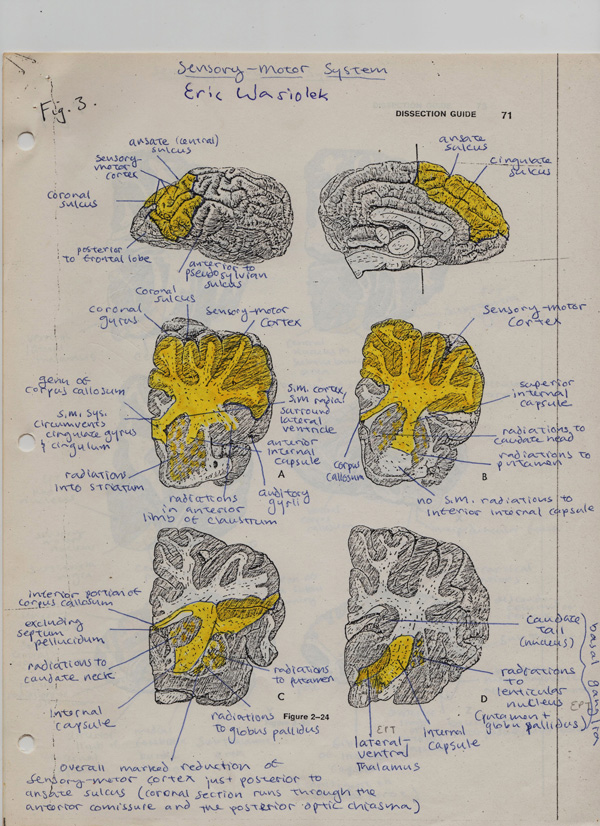
Click on Image to See Paper on the Sensory Motor
System |
Physiological Psychology
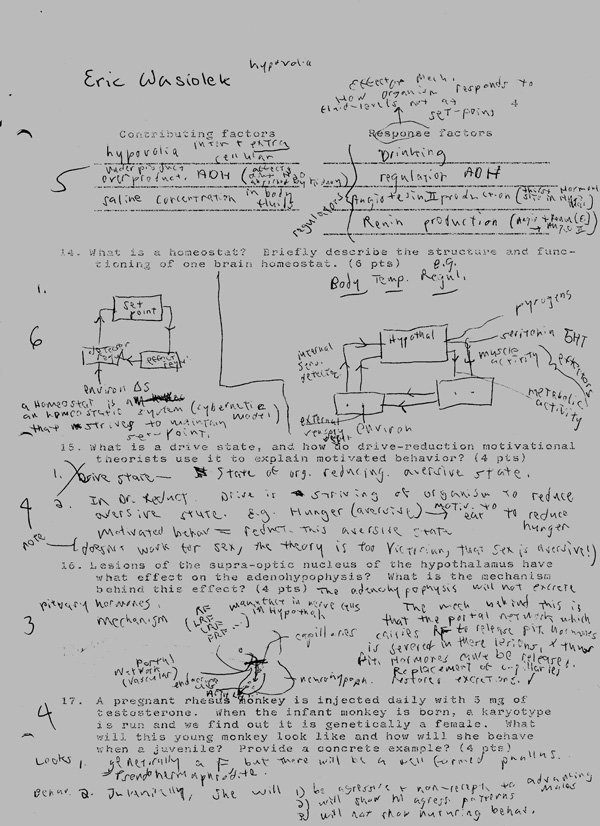
Click on Image to See Paper the Test (written
with my left hand as right hand was injured) |
Physiological Psychology
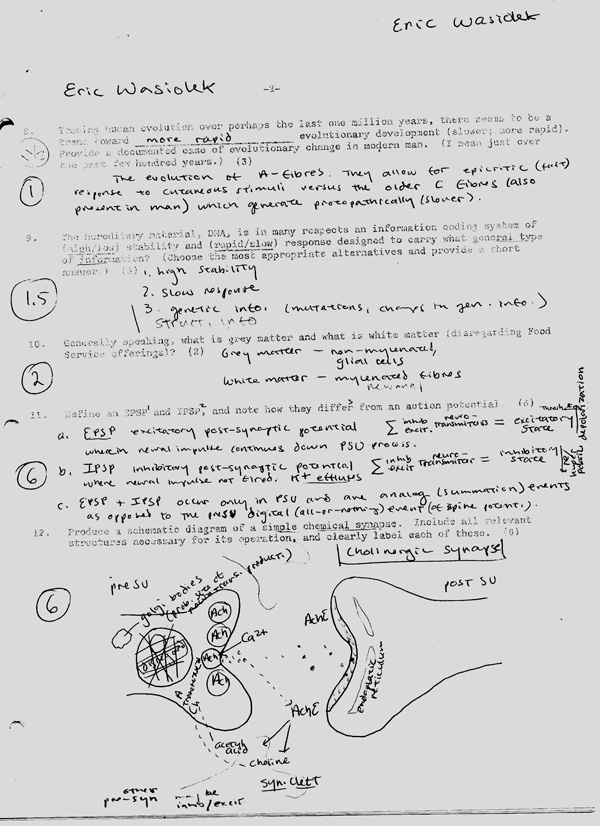
Click on Image for Full View |
|
Russian Courses
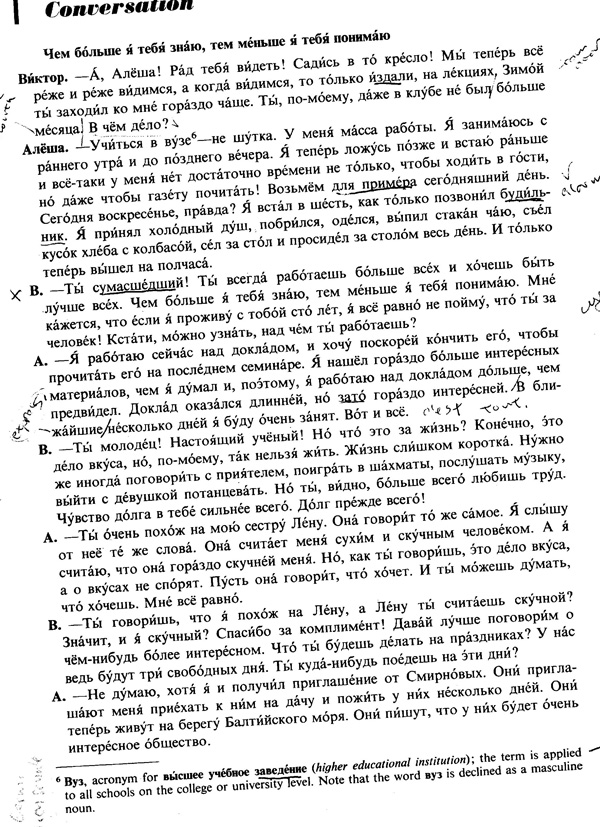
Click on Image for Full View |
German (Self Taught)

Taught myself German and then lived in Germany in
1977, Read Also Sprach Zarathrustra (Thus Spake Zarathrustra) on
own in German and the above was my favorite passage. Studied the
grammars of some twenty other languages (foreign languages a hobby).
My goal was to read Philosophy in German (a very logical language).
Click on Image for Full View |
French - Les Correspondences
La
nature est un temple ou de vivant pilliers
Laisse parfois sortir de confuses paroles
L’homme y passe a travers des forets de symboles
Qui
l’observent avec des regards familiers
Comme de longs echos qui de loin se confondent
Dans
une ténébreuse et profonde unite
Vaste comme la nuit et come la clarte
Les
parfums, les couleurs et les sons se répondent
Ayant l’expansion des choses infinies
Comme l’ambre, le musc, le benjoin et l’encens
Qui
chantent les transports de l’esprit et des sens |
|
|
U.C. Berkeley - Philosophy (and the Mind/Brain Problem)
When I got to U.C. Berkeley I had to declare a major immediately.
My goal at this point was just to finish undergraduate. I declared
Philosophy, my life long love. In Philosophy I was primarily focused
on the mind/brain problem, are the mind and the brain the same and what is
the relationship between the two? We still do not know how the brain
produces subjective experience if it does; the relationship is
mysterious. Note that the mind/brain problem also involves questions
about whether the mind is a computer which led my to interest in cognitive
science, artificial intelligence, and computing in general. Having completed
all of my general college requirements at Grinnell I only took Philosophy
courses at U.C. Berkeley which included Philosophy of Mind, two semesters of
Symbolic (Mathematical) Logic, Theory of Knowledge (Epistemology), Ethics,
Theory of Meaning, Phenomenology, Philosophical Methods, and History of
Philosophy courses including ancient and modern (Kant and the Empiricists)
Philosophy, Descartes, Hegel, and Aristotle. See my
Philosophical Papers.
|
Symbolic Logic (Philosophy 12B)
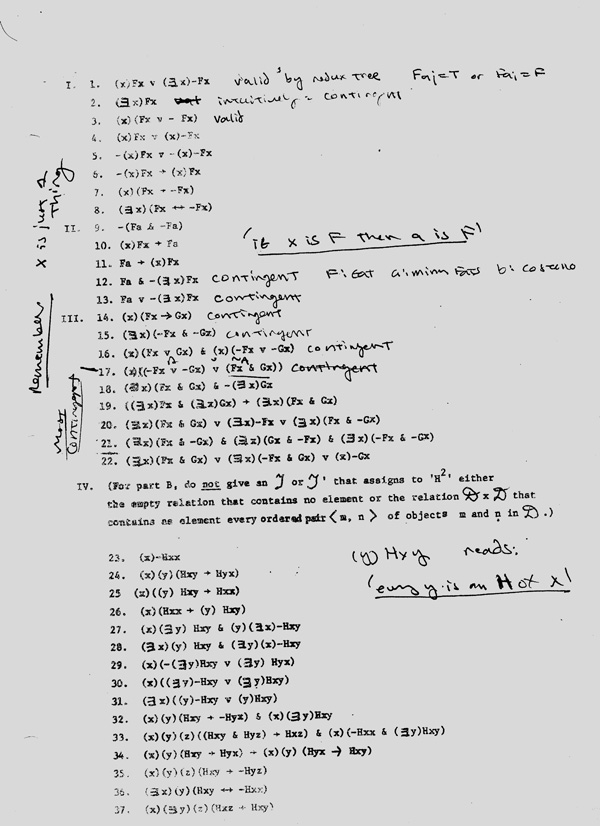
Click on Image for Full View |
Symbolic Logic (Philosophy 12B)
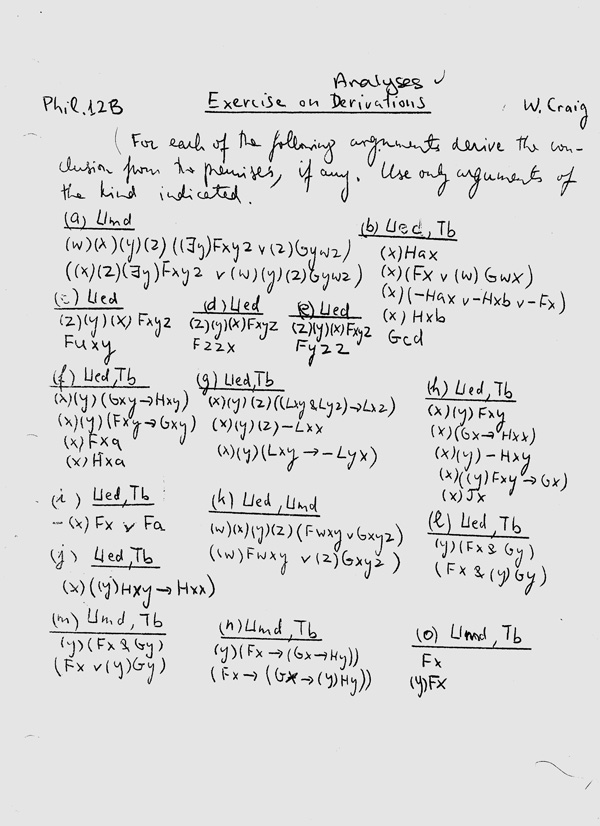
Click on Image for Full View |
Symbolic Logic (Philosophy 12B)
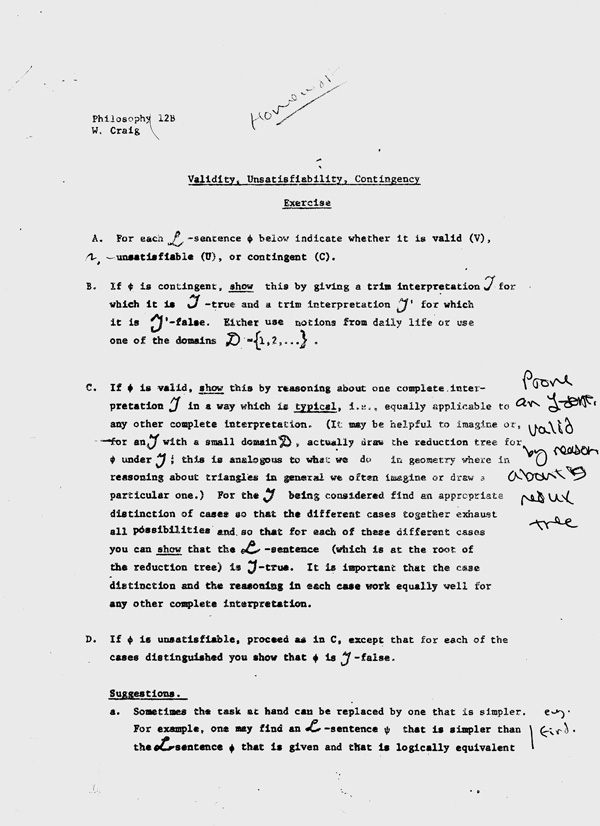
Click on Image for Full View |
|
Philosophy of Mind Paper

Click on Image for Full View |
Epistemology Final
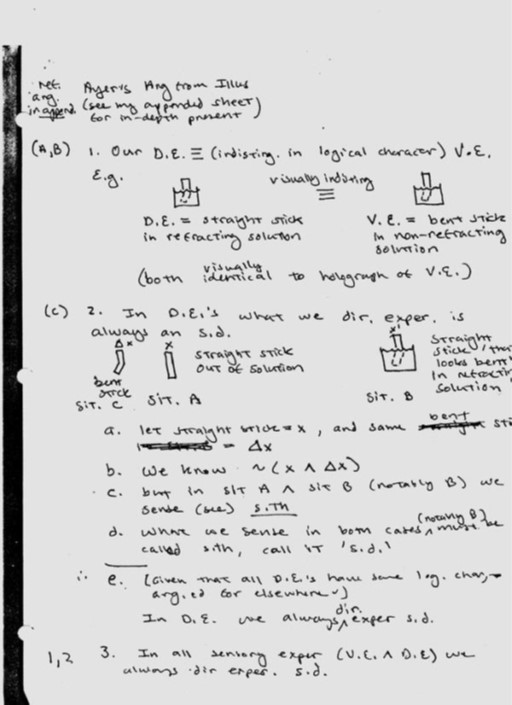
Click on Image for Full View |
Locke Nominal Essence Paper

Click on Image for Full View |
|
|
Computer Field --- Self Taught and Distributed Systems
When I entered the computer field I had no computer science degree, had
only taken two computer science courses, and didn't know how to program.
To function, I had to teach myself computing. This started with
reading Adam Osborne's book on Microcomputers while working at a
Microprocessor Development System Company. When I was promoted to UNIX
Microprocessor Development System Product Marketing Engineer I had to learn
UNIX and C. I learned UNIX from books and using it and I took a course
on C. I was lucky: I was working for a company that manufactured
computers that build computers. I then went into database as a systems
engineer (I had become technical enough to hold that job) and read Date's
books on relational database while working with relational databases.
I went to Excelan a networking vendor to become a Product Manager learning
networking. This is where I started to specialize in distributed
systems by writing and publishing articles on distributed computing and
distributed applications. This led to the Ingres job which combined my
background in database and networking and expertise in heterogeneous
distributed systems as evidenced by the articles to become the Product
Marketing Manager for STAR, a networked distributed database system.
Despite some disruptions I continued my career in open systems at Oracle
running the Coexistence Seminars which showed how to integrate proprietary
and open UNIX systems. I switched from Philosophy to reading nothing
but computer books, manuals, and articles. Below are the articles I
published on distributed computing.
|
The Big Picture: Database
Gateways
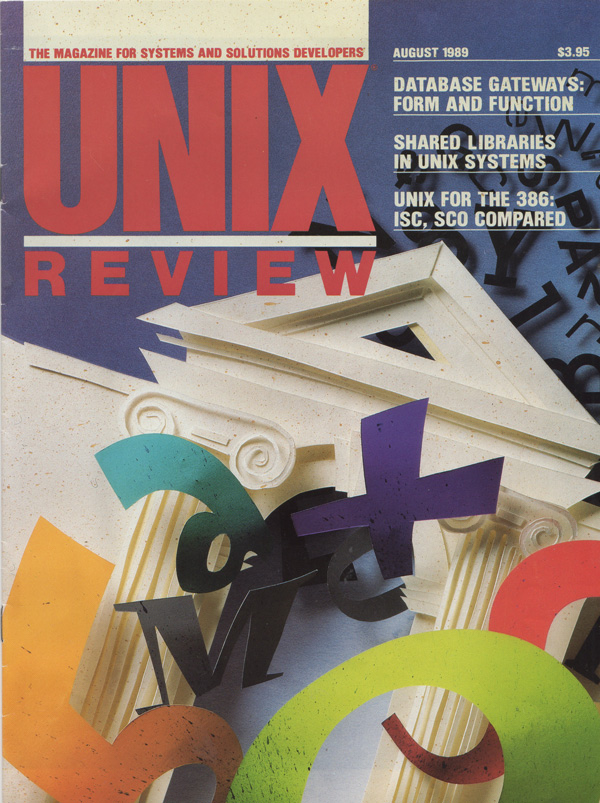
Click on Image to Read Article |
Heterogeneous Distributed Applications
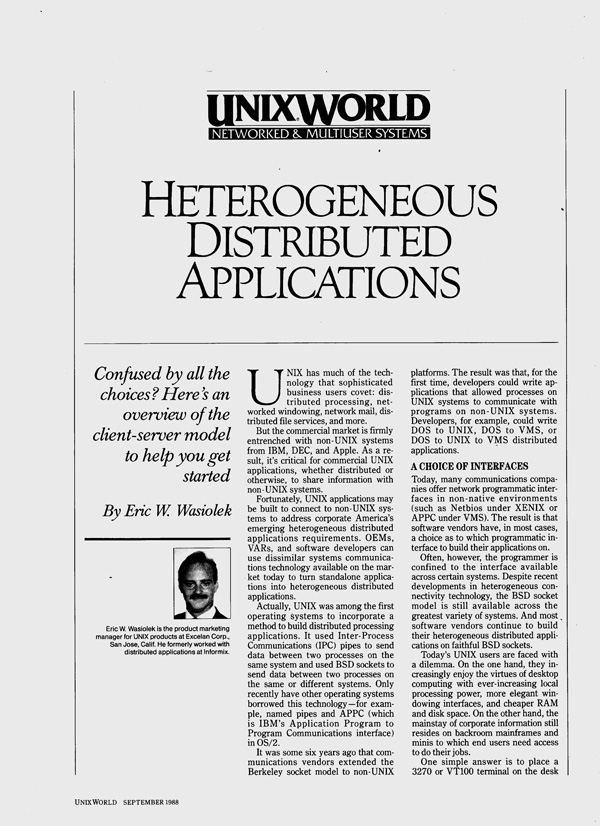
Click on Image to Read Article. |
Distributed Applications
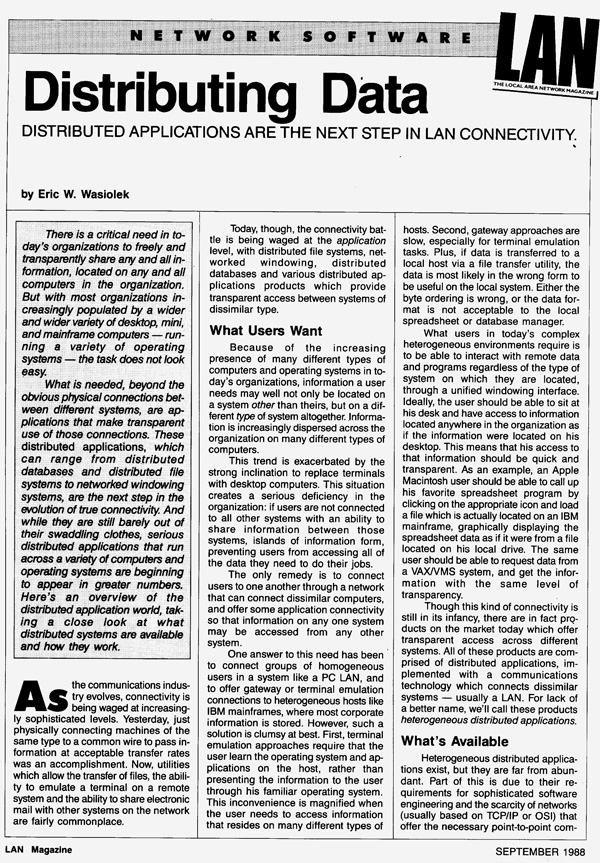
Click on Image to Read Article |
|
Incorporating Systems Applications into the
Operating System
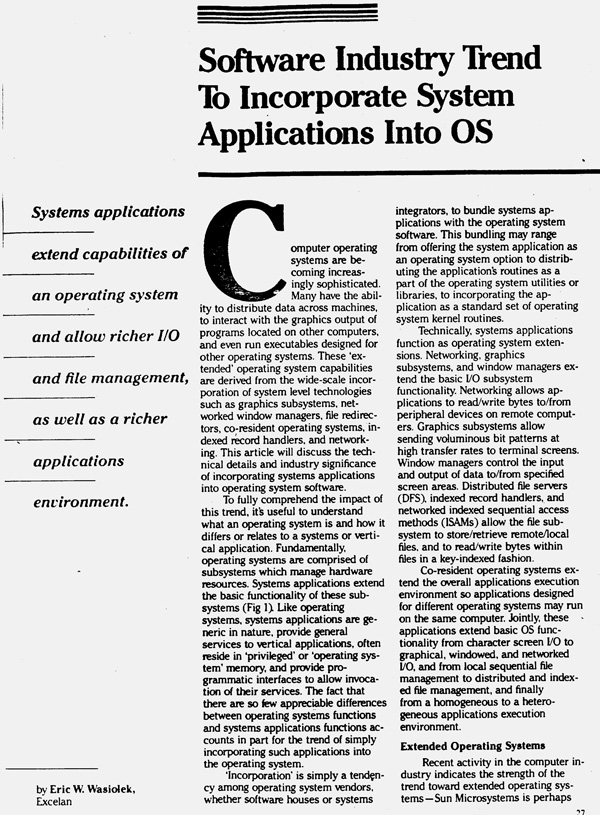
Click on Image to Read Article |
Heterogeneous Distributed File Systems
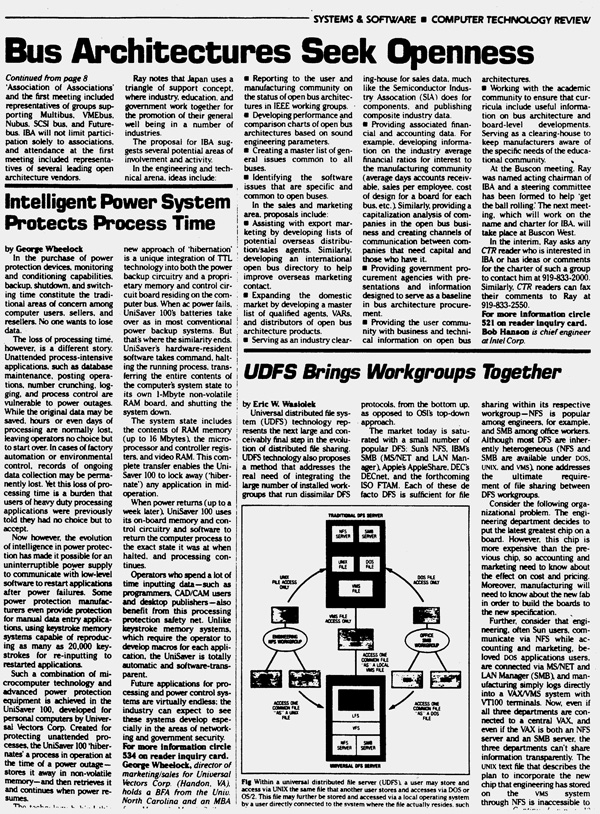
Click on Image to Read Article |
Coexistence Strategies
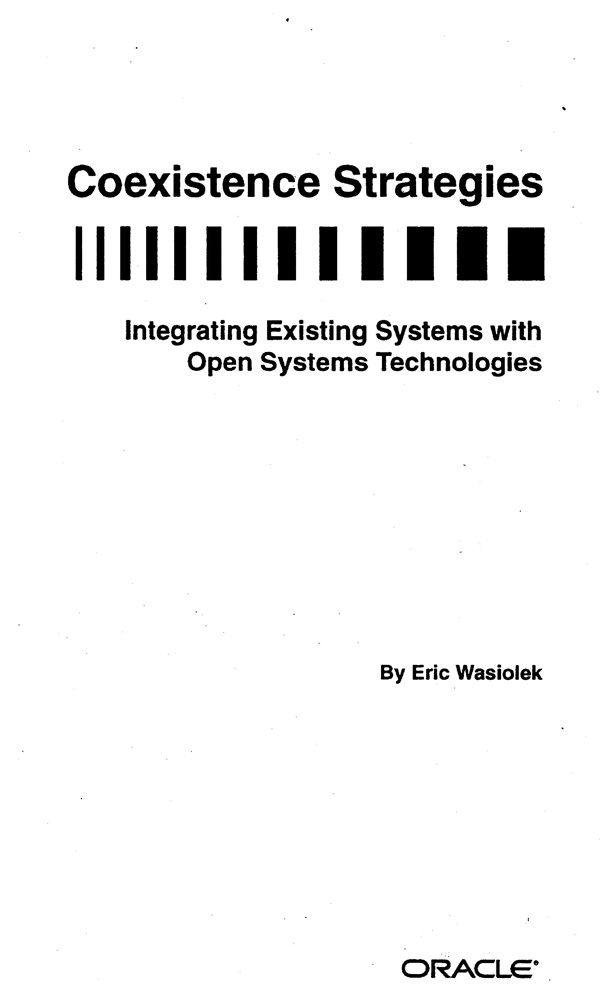
Click on Image to Read Article |
|
Informix Development Tools
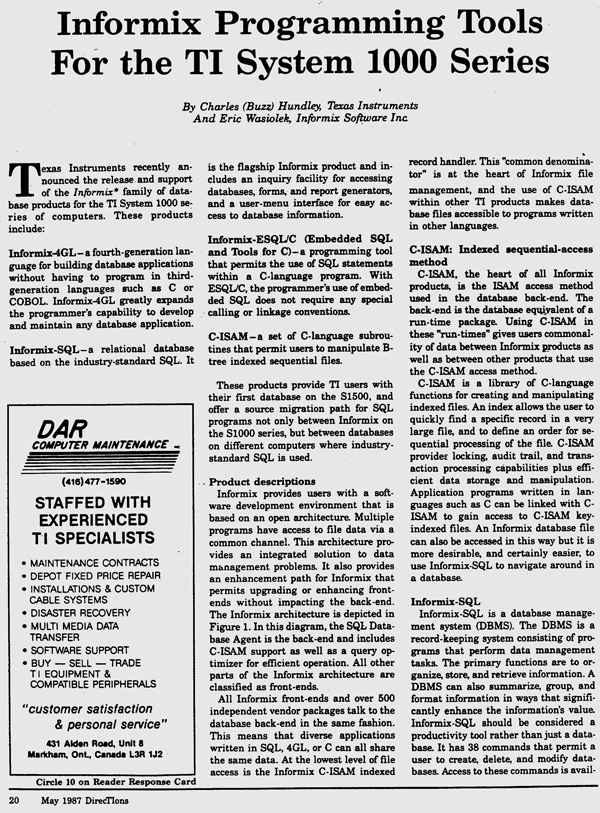
Click on Image to Read Article |
Distributed Computing: A Heterogeneous Approach
(Book)
|
Distributed Computing
|
|
|
Computational Molecular Biology --- Disciplines on the
Boundary
My Masters in Computational Molecular Biology is a boundary field which
combines math and computer science with molecular biology (which itself is a
combination of biology and chemistry). The most interesting
developments occur on boundaries between different departments of knowledge.
Click here for a detailed description of this
degree. This degree involved the mathematical and computational analysis
of genetic and proteomic sequences as well as the understanding of
biomolecular techniques and computer simulations of biological phenomena
such as the growth of the brain of C. Elegans as was done in the thesis.
Courses included: Molecular Biology (I, II, & III), Statistics for
Bioinformatics, Bioinformatics, Advanced Bioinformatics (including
Chemoinformatics), Courses in C++ including Data Structures, Perl
Programming, Graduate Computer Simulation, Neurobiology, Functional
Genomics, Developmental Genetics, Stochastic Processes (advanced Math
including Calculus and Linear Matrix Algebra), and others completed with a
3.84 GPA. This degree prepared me to be able to work not only in
the computer industry but also in the biotech industry. Very few
people have this combination of knowledge. Below are some sample
classes.
|
|
Stanford Masters Thesis in Computational Biology
I did my Masters Thesis at Stanford with a Stanford professor utilizing
their computing facilities. I wrote seventeen programs which analyzed
the brain (nervous system) of a worm (C elegans) by representing the brain
as a graph (with nodes/vertices and links/edges) and then running various
algorithms on that graph data structure. This was a computational
neuroscience project. The thesis won best thesis in the school of
science at Cal State East Bay. The thesis was 300 pages (available
through the link below). The research and thesis was in Computational
Neuroscience (I am a bit of a neuroscientist).
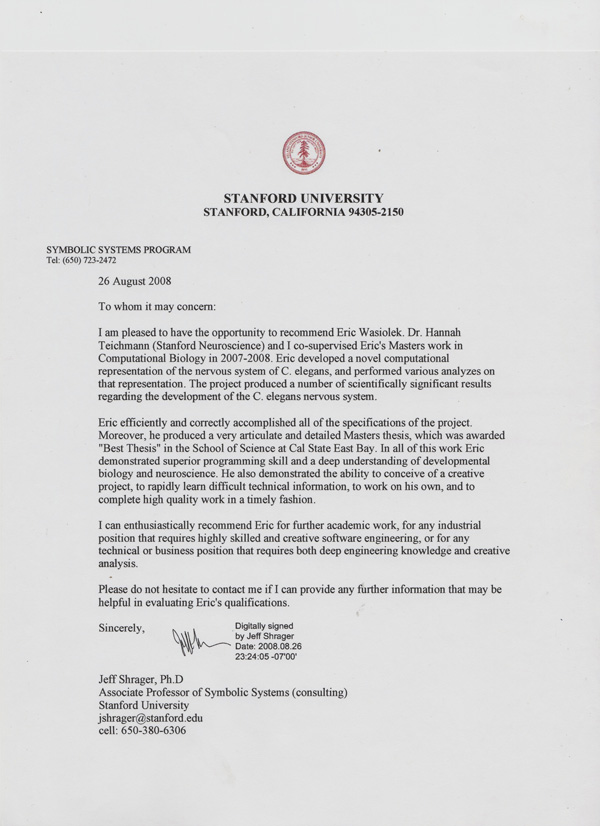
Click on the Image for Full View of the Stanford
Recommendation. |
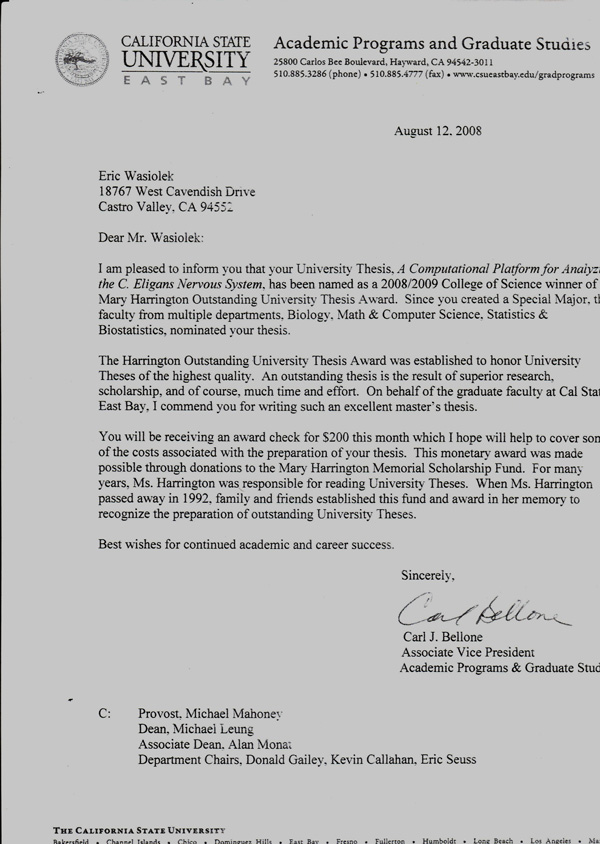
Click on the Image for Full View of the Best
Masters Thesis Award. |
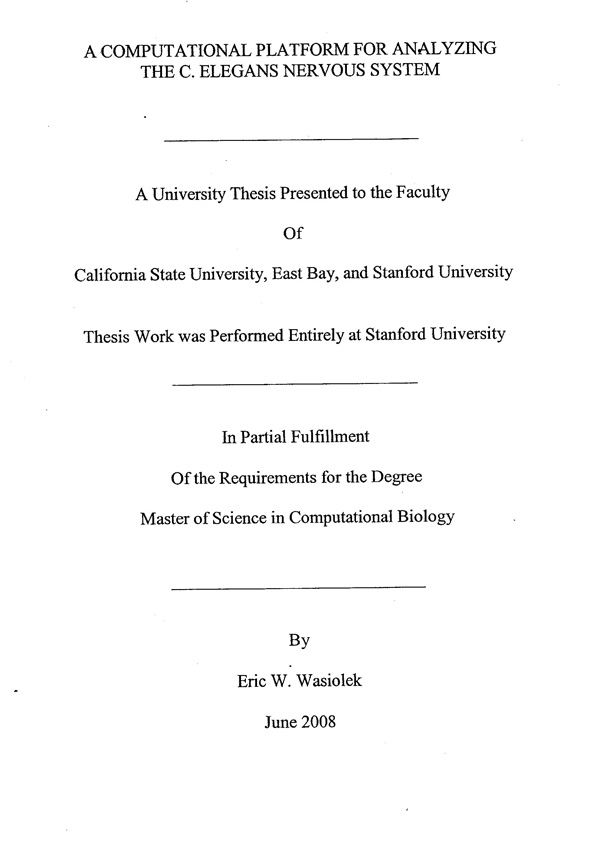
Click on the Image to Read the Masters Thesis. |
|
Abstract
A computer program was developed to combine
developmental, neural, and genetic information to predict the neural and
synaptic development of C. Elegans. The program divides development
into development stages based upon the number of cell divisions required
to generate each neuron. A representation of the synaptic network for
each development stage is generated and this represents completely novel
information. Further computational tools were developed to analyze the
synaptic network of the developing animal. These tools find pathways
between an input set of sensory neurons and output set of motor neurons
to indicate circuit formation and the genetic makeup of circuit
formation. Other tools analyze the number of inputs and outputs through
neurons or neuron subpaths indicating high throughput neurons and
ganglia worthy of further biological analysis. Finally, a relationship
between development and synapse formation was sought by correlating
lineage distance and synaptic distance. |
Thesis Defense
For a synopsis of the masters thesis (what it is about) click on the
link below:
Masters Thesis Defense
This defense explains how a developmental model of the brain of C
Elegans was developed and the synaptic pathway analysis tools that
analyzed the neural network of that brain. Finally how synaptic
and lineage distance were correlated was discussed.
|
Signatories
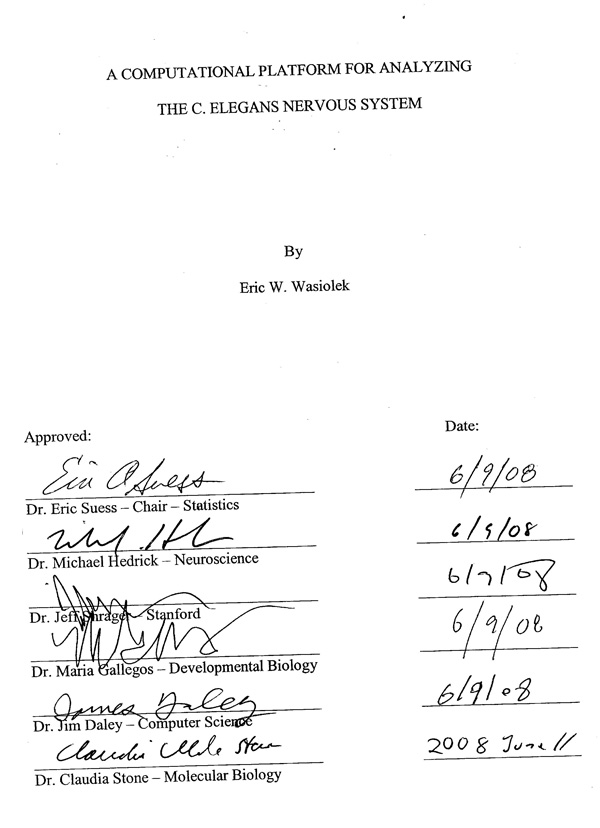
Click on the Image for Full View. |
|
Subpaths - Thesis Program
for(int pass = 0; pass < passes; ++pass)
{
for(int i=1; i < number; ++i)
{
for(int j=0; j<length; ++j)
subpath.push_back(v[i+j]);
cout << "subpath is: ";
writeList(subpath, " ");
cout << endl;
nrinsert(subpath, vsubpaths);
subpath.erase(subpath.begin(), subpath.end());
}
++length;
--number;
} Click on
this Link to See the Full Program |
Develstages - Thesis Program
set<string> findGeneSet(string
neuronname, neuron neuron[], int numneurons){
for(int i=0; i < numneurons; ++i)
if(neuronname == neuron[i].getName())
return neuron[i].getGenes();}
int min(neuron n[], int numneurons){
for(int i = 0; i < numneurons; ++i)
if(n[i].getLineage().length() < min)
min =
n[i].getLineage().length();
return min;}
Click on this
Link to See the Full Program |
Bitgenes - Thesis Program
vector< vector<bool> > bvect(numneurons);
for(i = 0; i < numneurons; ++i)
{
while(fsiter != esiter)
{
if(find(*fsiter, vs[i]))
bvect[i].push_back(true);
else
bvect[i].push_back(false);
++fsiter;
}
fsiter = us.begin();
}
Click on this Link
to See the Full Program |
| |
|
|
|
|
MBA --- What Can Business School Teach Me That I Don't
Already Know?
I went to business school, a little out of character, for three reasons:
I wanted to have a professional degree, I wanted to find out what a business
degree can teach me that I don't already know from having worked in a
technical and business capacity in the computer field, and I had a genuine
interest in world economics. I am more interested in economics than
business and approach politics only from the standpoint of political
economies. I did finish in the upper 1% of my class, gaining the
prestigious Beta Gamma Sigma award, and was the top marketing and top
finance student. I had a concentration in Marketing as that is what I
had done in my career. Business school was not what I expected.
It was VERY MATHEMATICAL! They teach you to do calculations and the
calculation results will tell you how to decide (what to do in) a business
situation.
| Finance Recommendation
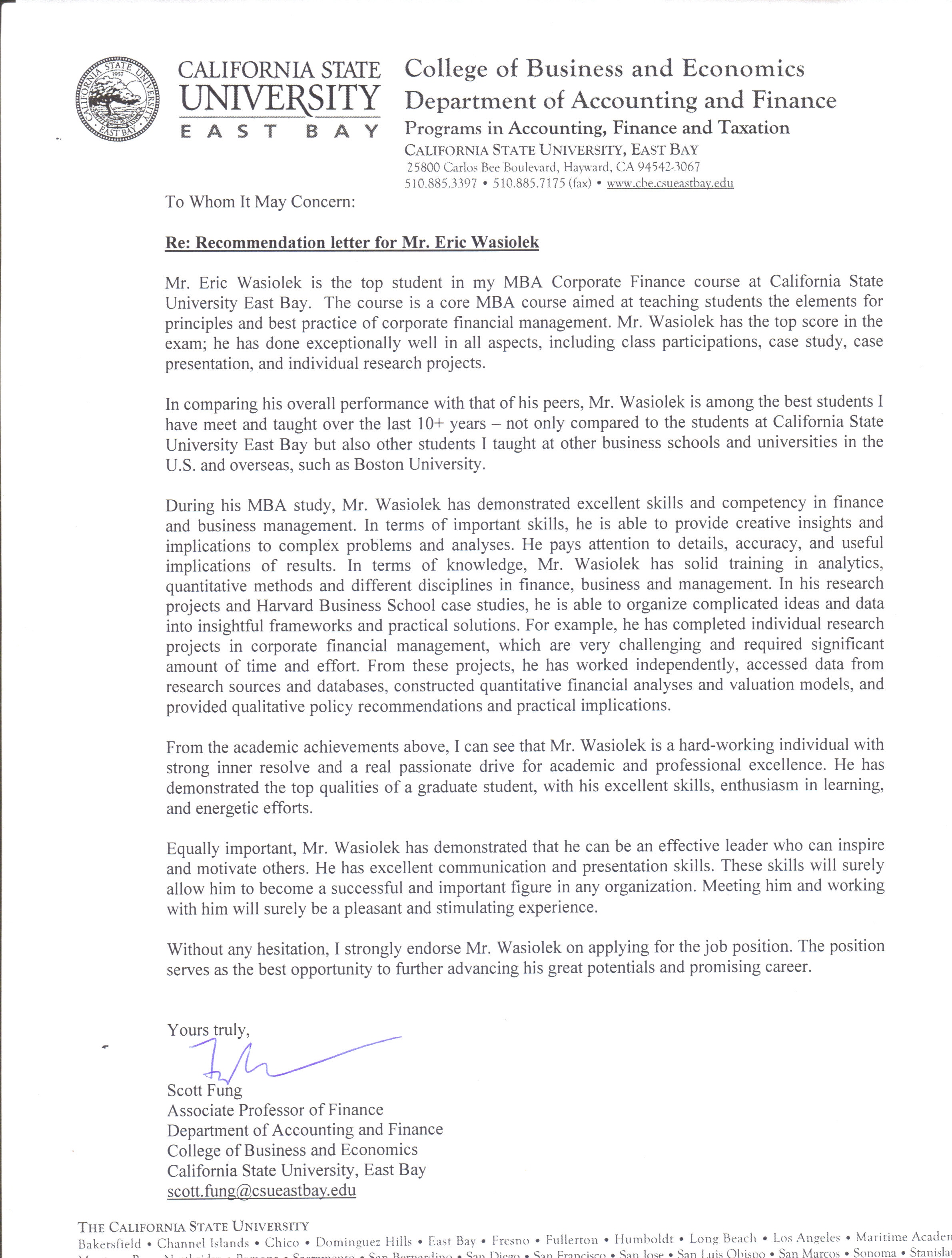
Click on Image to Read Recommendation. |
Marketing Recommendation
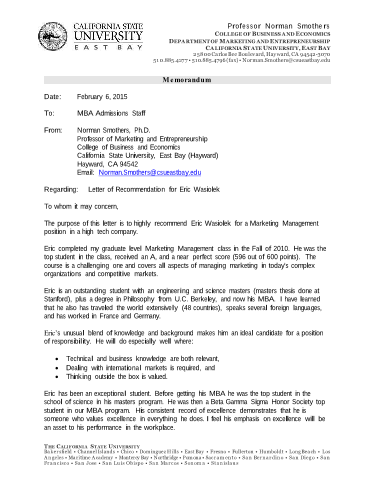
Click on Image to Read Recommendation |
Catepillar Recommendation
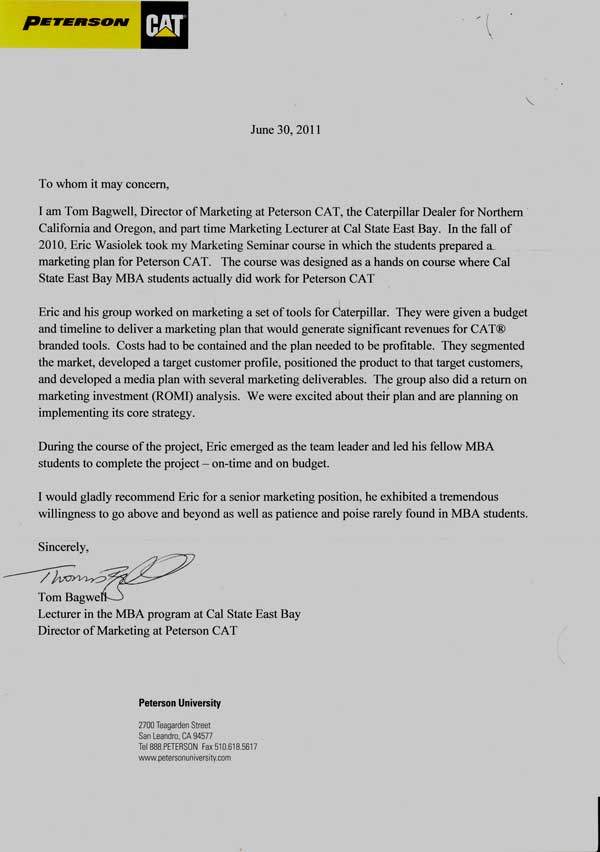
Click on Image to Read Recommenation. |
| Business Plan (by Eric and
Classmates)
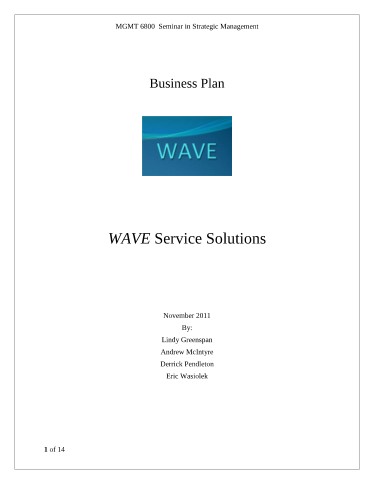
Click on Image to Read Business Plan |
Assignment |
Assignment |
|
|
Doctorate in Computer Science (With 4.0 GPA)
My doctorate in computer science was the culmination of my love affair
with computers, computer technology, and Silicon Valley. I had already
taught myself to program and had already achieved significant understanding,
at least conceptually of computer scientific technology. My computer
science degree was largely online, although it was required to attend four
seminars in Colorado to get the degree. Computer science is a degree
which is highly achievable online as programming can be done locally and
sent over the internet to be compiled and viewed and tested online by the
professor. I did complete the degree with a perfect 4.0
GPA. The program involved 96 credits in computer science plus an
original dissertation. My dissertation was entitled "Exploring
the Pattern Recognition, Machine Learning, and Next Generation Sequencer
Algorithm Improvements Needed to Analyze Big Genomic Data Sets."
| Distributed Computing
Recommendation
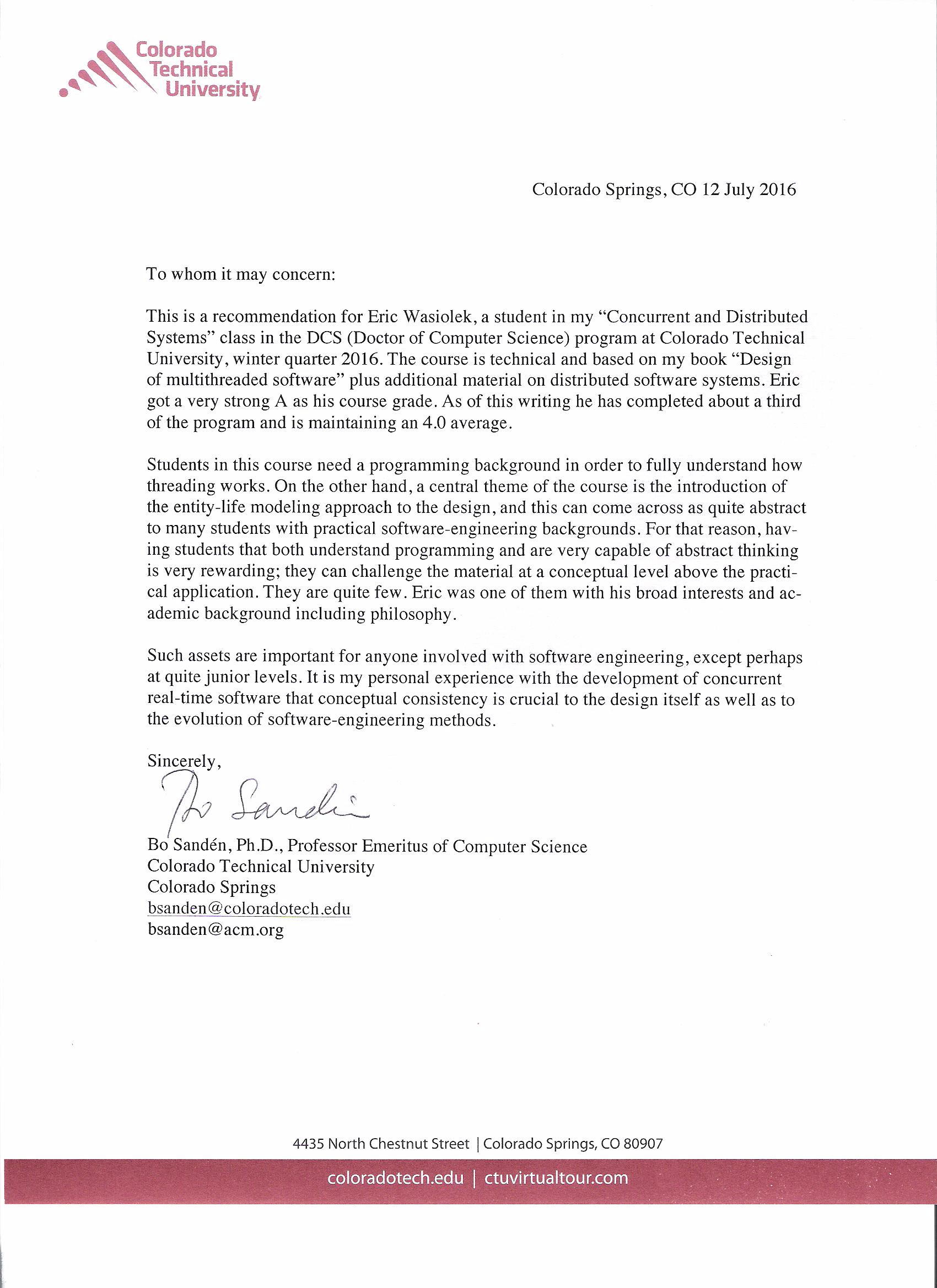
Click on Image to See Recommendation. |
Cyber-Security
Recommendation
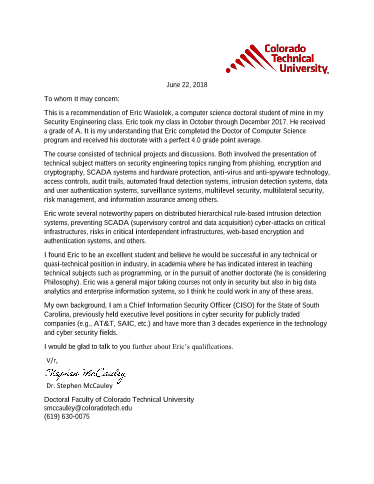
Click on Image to See Recommendation. |
R Programming
Recommendation
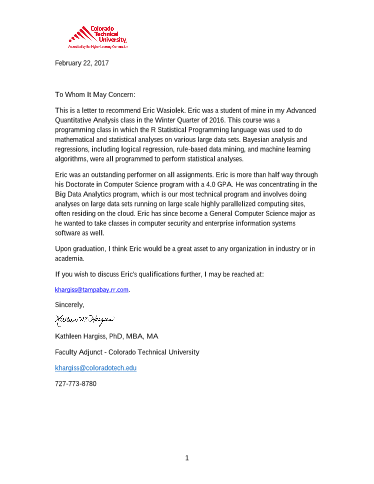
Click on Image to See Recommendation |
| Dissertation Recommendation
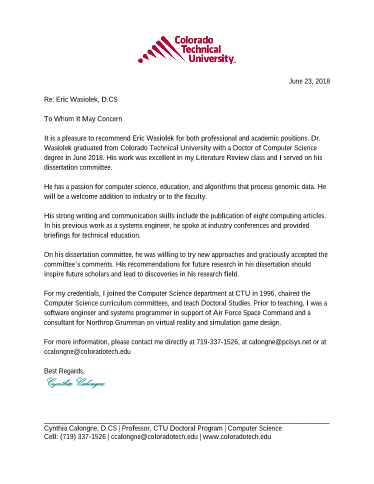
Click on Image to See Recommendation |
Distributed Computing
Assignments
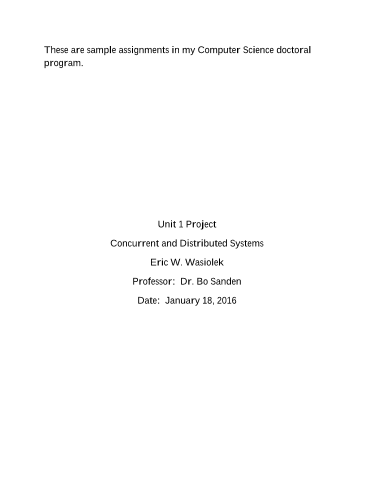
Click on Image to See Assignments |
Sample Assignments |
| Dissertation Snippets |
Dissertation Defense |
Diploma |
| |
|
|
|
|
Self-Taught Knowledge I estimate that all of my
degrees account for only 20% of my knowledge. At least 80% of what I
know I have taught myself. This includes foreign languages,
programming, and a host of other knowledge areas acquired through personal
projects. The greatest thing I learned in college (undergraduate) was
how to teach myself. I spent a lifetime teaching myself (sometimes to
the detriment of doing homework which resulted in less than spectacular GPAs
prior to graduate work). I didn't really care about grades or work to
get good grades until graduate school. I taught myself foreign
languages: Latin and German and some Hebrew and vocabulary in high
school (I used to read the dictionary), the grammars of some 26 languages
while at Grinnell (including ancient Greek), C and C++ programming, the
entire computing field when working, notably distributed computing, and
other topics when I stopped working such as telecommunications, multi-media,
neuro-computing, Thai and Hindi (I like to learn a little of the language
for any country I travel to) digital and analog electronics, electrical
engineering, cognitive science, matrix algebra, Markov chains, theory of
computation, Physics and physical sciences, Astronomy, largely qualitative
study of quantum mechanics, cell molecular biology,
|
| |
| |
|